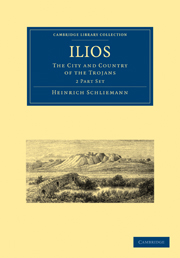Book contents
- Frontmatter
- Contents
- MAPS AND PLANS
- DIAGRAM
- COMPARATIVE TABLE OF FRENCH AND ENGLISH MEASURES, EXACT AND APPROXIMATE
- PREFACE
- INTRODUCTION.—AUTOBIOGRAPHY OF THE AUTHOR, AND NARRATIVE OF HIS WORK AT TROY
- CHAPTER I THE COUNTRY OF THE TROJANS (οἱ Τρῶες)
- CHAPTER II ETHNOGRAPHY OF THE TROJANS: THEIR SEVERAL DOMINIONS IN THE TROAD: TOPOGRAPHY OF TROY
- CHAPTER III THE HISTORY OF TROY
- CHAPTER IV THE TRUE SITE OF HOMER'S ILIUM
- CHAPTER V THE FIRST PRE-HISTORIC CITY ON THE HILL OF HISSARLIK
- CHAPTER VI THE SECOND PRE-HISTORIC CITY ON THE SITE OF TROY
- CHAPTER VII THE THIRD, THE BURNT CITY, Page 305 to 357
- THE THIRD, THE BURNT CITY, Page 358 to 413
- THE THIRD, THE BURNT CITY, Page 414 to 465
- THE THIRD, THE BURNT CITY, Page 466 to 517
- CHAPTER VIII THE FOURTH PRE-HISTORIC CITY ON THE SITE OF TROY
- CHAPTER IX THE FIFTH PRE-HISTORIC CITY OF TROY
- CHAPTER X THE SIXTH CITY, MOST PROBABLY A LYDIAN SETTLEMENT
- CHAPTER XI THE SEVENTH CITY: THE GREEK ILIUM; OR NOVUM ILIUM
- CHAPTER XII THE CONICAL MOUNDS IN THE TROAD CALLED THE HEROIC TUMULI
- APPENDIX I TROY AND HISSARLIK
- APPENDIX II ON THE RELATION OF NOVUM ILIUM TO THE ILIOS OF HOMER
- APPENDIX III THE INSCRIPTIONS FOUND AT HISSARLIK
- APPENDIX IV THYMBRA, HANAÏ TEPEH
- APPENDIX V MEDICAL PRACTICE IN THE TROAD IN 1869
- APPENDIX VI CATALOGUE OF THE PLANTS HITHERTO KNOWN OF THE TROAD, COMPILED ACCORDING TO THE COLLECTIONS OF PROFESSOR RUDOLF VIRCHOW AND DR. JULIUS SCHMIDT, AND FROM THE LITERARY SOURCES BY PROFESSOR PAUL ASCHERSON OF BERLIN, PROFESSOR THEODOR VON HELDREICH OF ATHENS, AND DOCTOR F. KURTZ OF BERLIN
- APPENDIX VII ON THE LOST ART OF HARDENING COPPER
- APPENDIX VIII ON HERA BOÖPIS
- APPENDIX IX TROY AND EGYPT
- INDEX
- Plate section
CHAPTER XI - THE SEVENTH CITY: THE GREEK ILIUM; OR NOVUM ILIUM
Published online by Cambridge University Press: 05 August 2011
- Frontmatter
- Contents
- MAPS AND PLANS
- DIAGRAM
- COMPARATIVE TABLE OF FRENCH AND ENGLISH MEASURES, EXACT AND APPROXIMATE
- PREFACE
- INTRODUCTION.—AUTOBIOGRAPHY OF THE AUTHOR, AND NARRATIVE OF HIS WORK AT TROY
- CHAPTER I THE COUNTRY OF THE TROJANS (οἱ Τρῶες)
- CHAPTER II ETHNOGRAPHY OF THE TROJANS: THEIR SEVERAL DOMINIONS IN THE TROAD: TOPOGRAPHY OF TROY
- CHAPTER III THE HISTORY OF TROY
- CHAPTER IV THE TRUE SITE OF HOMER'S ILIUM
- CHAPTER V THE FIRST PRE-HISTORIC CITY ON THE HILL OF HISSARLIK
- CHAPTER VI THE SECOND PRE-HISTORIC CITY ON THE SITE OF TROY
- CHAPTER VII THE THIRD, THE BURNT CITY, Page 305 to 357
- THE THIRD, THE BURNT CITY, Page 358 to 413
- THE THIRD, THE BURNT CITY, Page 414 to 465
- THE THIRD, THE BURNT CITY, Page 466 to 517
- CHAPTER VIII THE FOURTH PRE-HISTORIC CITY ON THE SITE OF TROY
- CHAPTER IX THE FIFTH PRE-HISTORIC CITY OF TROY
- CHAPTER X THE SIXTH CITY, MOST PROBABLY A LYDIAN SETTLEMENT
- CHAPTER XI THE SEVENTH CITY: THE GREEK ILIUM; OR NOVUM ILIUM
- CHAPTER XII THE CONICAL MOUNDS IN THE TROAD CALLED THE HEROIC TUMULI
- APPENDIX I TROY AND HISSARLIK
- APPENDIX II ON THE RELATION OF NOVUM ILIUM TO THE ILIOS OF HOMER
- APPENDIX III THE INSCRIPTIONS FOUND AT HISSARLIK
- APPENDIX IV THYMBRA, HANAÏ TEPEH
- APPENDIX V MEDICAL PRACTICE IN THE TROAD IN 1869
- APPENDIX VI CATALOGUE OF THE PLANTS HITHERTO KNOWN OF THE TROAD, COMPILED ACCORDING TO THE COLLECTIONS OF PROFESSOR RUDOLF VIRCHOW AND DR. JULIUS SCHMIDT, AND FROM THE LITERARY SOURCES BY PROFESSOR PAUL ASCHERSON OF BERLIN, PROFESSOR THEODOR VON HELDREICH OF ATHENS, AND DOCTOR F. KURTZ OF BERLIN
- APPENDIX VII ON THE LOST ART OF HARDENING COPPER
- APPENDIX VIII ON HERA BOÖPIS
- APPENDIX IX TROY AND EGYPT
- INDEX
- Plate section
Summary
REMAINS OF THE CITY.
The founders of Novum Ilium built their city both to the east and to the south of Hissarlik, and used this hill as their Acropolis and the seat of their sanctuaries. They did so probably for three reasons: first, because they were conscious of the fact, that here had once stood the sanctuary of Athené as well as the houses of Troy's last king and his sons, and that here the fate of sacred Ilios had been decided, and therefore a religious reverence deterred them from giving up the place to profane use; secondly, because Hissarlik had strong natural defences, and was admirably situated for an Acropolis; and, in the third place, because the new settlers were too numerous to build their town on so small a space. This explains the thinness of the Greek stratum of débris on Hissarlik, the scarcity of objects of human industry, even of fragments of pottery, and the abundance of terra-cotta figurines and round pieces of terra-cotta, in the form of watches, with two perforations, which here replace the prehistoric whorls, and seem, along with the figurines, to have served as votive offerings. In commemoration of the Acropolis of old, erroneously attributed to Ilium by Homer, and probably believed by the new settlers to have occupied this identical hill, Hissarlik was thenceforth called Pergamus, or Priam's Pergamon, as Herodotus names it.
- Type
- Chapter
- Information
- IliosThe City and Country of the Trojans, pp. 608 - 647Publisher: Cambridge University PressPrint publication year: 2010First published in: 1880

